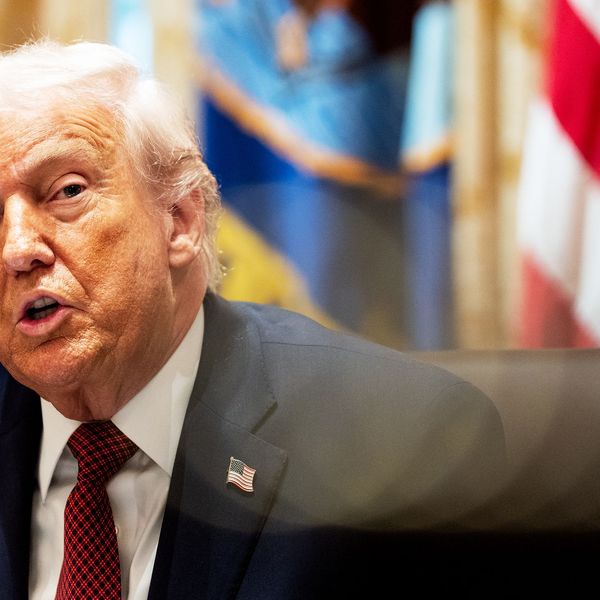Following diplomatic talks between North and South Korea aimed at easing tensions over military drills and nuclear weapons, the North has agreed to send a contingent of athletes and high ranking officials to the Olympic Games in PyeongChang next month, even as the Trump administration is reportedly considering launching a limited attack on a North Korean facility in what's been dubbed a "bloody nose" strike.
Tuesday's talks--the first in over two years--come in response to a overture by North Korea leader Kim Jong Un amid global concerns over his country's nuclear weapons program. As Korean diplomats meet at a village on the nations' militarized border to discuss the Olympics--including the proposal that both countries march together during opening and closing ceremonies--and family reunification, with the hope of working toward the nuclear issue, the Wall Street Journal reports, "U.S. officials are quietly debating whether it's possible to mount a limited military strike against North Korean sites without igniting an all-out war on the Korean Peninsula."
The Journal's Washington bureau chief, Gerald F. Seib, details what he calls the "enormously risky idea" that U.S. war hawks within the Trump administration are supposedly weighing:
The idea is known as the "bloody nose" strategy: React to some nuclear or missile test with a targeted strike against a North Korean facility to bloody Pyongyang's nose and illustrate the high price the regime could pay for its behavior. The hope would be to make that point without inciting a full-bore reprisal by North Korea.
It's an enormously risky idea, and there is a debate among Trump administration officials about whether it is feasible. North Koreans have a vast array of artillery tubes pointed across the demilitarized zone at Seoul, the capital of South Korea, with which they could inflict thousands of casualties within minutes if they choose to unleash an all-out barrage.
Now, that danger is coupled with the risk that the North Koreans could attempt to use a nuclear weapon if they choose to escalate in retaliation against even a single strike.
Officials told Seib that within the Trump administration, the president is the "wild card," as Secretary of State Rex Tillerson and Defense Secretary Jim Mattis push for a diplomatic effort to convince North Korea to denuclearize, while national security adviser H.R. McMaster "is arguing more vocally, publicly and privately, that military options need to be considered."
As the administration's warring factions lobby for the support of a president who has repeatedly attacked the diplomatic route and is inclined to possibly provoke nuclear war with fiery tweets aimed at Kim, the open question remains whether diplomatic talks will continue beyond the Olympics to address the issues critical to Seoul, namely the process of family reunification and lessening regional hostility.
Ultimately, Seib notes, "the diplomatic move needed to really start dialing back tensions would be conversations between North Korea and the U.S," and unfortuantely, "that possibility seems stuck in a long-distance dance between Pyongyang and Washington, with each side making opening bids the other finds unacceptable."
After the Journal story broke, politicians as well as international affairs and national security experts from across the political spectrum raised alarms about the potential consequences of a "bloody nose" strike:



